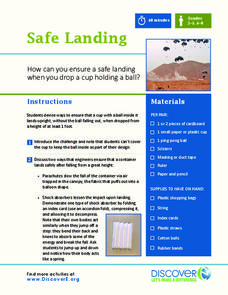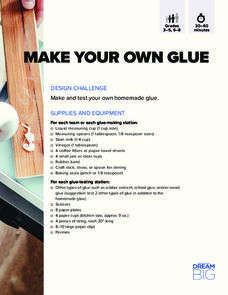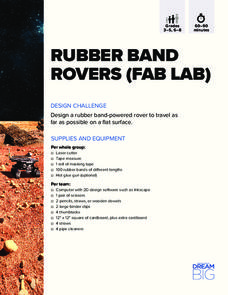DiscoverE
Safe Landing
Watch out below! Future engineers come up with methods to ensure that a ball in a cup stays in the cup even after dropped from a given height. It might be prudent to include some kind of shock absorber in the cup. Parachutes are a good...
DiscoverE
Heart Valve Replacement
Put your heart into it. Scholars design and build replacements for mitral heart valves. Obviously, they can't test their creations on a real heart, so a box with marbles (to represent blood cells) will suffice.
DiscoverE
Electrical Liquids
Liquid or not, here comes the electricity. Scholars test the conductivity of various substances using a circuit that includes a light bulb. If the light bulb lights up, then the liquid is a conductor. What a bright idea!
DiscoverE
Conveyor Belt
Convey your interest in conveyor belts. By considering different size tubes, groups create a conveyor belt that can transport boxes of candy at least four feet. Also, the conveyor belt must make a 90-degree turn—quite a difficult task!
DiscoverE
Nanosolutions
There are a billion reasons to use the resource! Well, not quite. A demonstration using food color and water shows scholars the meaning of nano. An iterative process results in diluting the concentration of food coloring by one tenth...
DiscoverE
My Friend Robot
Can you do better than a robot? Teams write instructions for a hypothetical robot to build a structure. They test their instructions by acting them out to see if they produce the desired structure.
DiscoverE
Make Your Own Glue
You won't regret being stuck with this activity. By mixing a variety of household items, pupils create their own glue. They test the tensile strength of their glue and compare it to that of other adhesives.
DiscoverE
Strong Paper Structure
Paper is a lot stronger than you think. Scholars create newspaper structures that can hold the weight of several books. For the purpose of this activity, the designs must be eight inches tall to be considered complete.
DiscoverE
Working with Watermills
Water is a powerful force; harness it through watermills. The task at hand is to create a simple watermill that functions in flowing water for at least three minutes. Scholars work together in teams to design and construct such a...
DiscoverE
Core Sampling
Simulate soil sample assemblages. Individuals create soil layers in a cup. They then use straws to collect core samples from these layers. What information can they glean from the core samples, I wonder?
DiscoverE
Keep-a-Cube
Waxed paper, newspaper, or aluminum foil? Keeping an ice cube from melting may require one or more of these materials. Learners design a box that will provide insulation so an ice cube stays intact for at least 90 minutes.
DiscoverE
Nanomedicine
Cancer patients need as much help as they can get. Future engineers design a system that delivers cancer medicine to the lungs but doesn't harm other organs. Using ferrofluids and iron particles, they test out their delivery systems.
DiscoverE
Build a Better Candy Bag
Every child's dream: stuffing as much candy into a bag as possible. Doing this, though, requires a nice sturdy bag. Scholars design the sturdiest bag they can and test the limits of those bag using a sweet treat!
DiscoverE
Shake It Up with Seismographs
Shake up your lessons on earthquakes. A simple seismograph lets scholars record "earthquakes" in the classroom. These earthquakes occur when classmates drop balls from different heights. Young scientists measure these with seismographs...
DiscoverE
Make a Light Bulb
Could you reinvent the light bulb? Scholars tap into their inner Thomas Edisons to build a light bulb prototype out of a jar and some wires. They see how long the filament wire glows in the jar (batteries not included) to measure their...
DiscoverE
Lego Structures
Let your class become master builders. Scholars use Legos® or K'nex® pieces to create a structure that looks like an actual building in existence. The time limit is 12 minutes, so you better start building!
DiscoverE
Design a Catapult
Just this once, it's okay to throw things in class. Out of craft sticks and rubber bands, pupils build catapults to launch an object of choice. This can be a ping-pong ball, a marshmallow, or any other small item. As long as it hits the...
DiscoverE
Rocket Challenge
You might just be responsible for launching a future career in rocket science. Pupils use Alka-Seltzer® tablets as the power source for a film-canister rocket. These rockets must able to carry a clay payload and hit a target on a wall.
DiscoverE
Puff Mobiles
You've probably heard of solar-powered cars, but what about wind-powered cars? Scholars build cars that can travel at least six feet. They can only use their breath to move the car—so, obviously, a sail might be a good feature for the...
DiscoverE
Rubber Band Rovers
Get your learners interested in space exploration. Groups design space rovers using design software and then build prototypes of their designs. The farther the rovers can travel, the better. The catch? The rovers must be powered by...
DiscoverE
Coding Without Computers
See what it feels like to be a robot. Scholars use programming vocabulary to program a human robot and test out their codes by acting them out. The code should result in stacking six cups into a pyramid.
DiscoverE
Laser Challenge
Help your class become laser focused on the connection between sound and light. Scholars set up mirrors to bend and direct lasers that are connected to a music source. Music should start playing when the laser hits the photoresistor.
DiscoverE
Squishy Circuits
Make electricity flow through Play-Doh. Individuals create animals or other creatures using Play-Doh. The engineering aspect? Eyes that light up and Play-Doh that conducts electricity.
DiscoverE
Touch Down
Protect the marshmallows! Groups create contraptions that will keep marshmallows in a cup, even after dropping them from a certain height. This is a fun way to model the shock-absorbing capabilities of spacecraft.

























